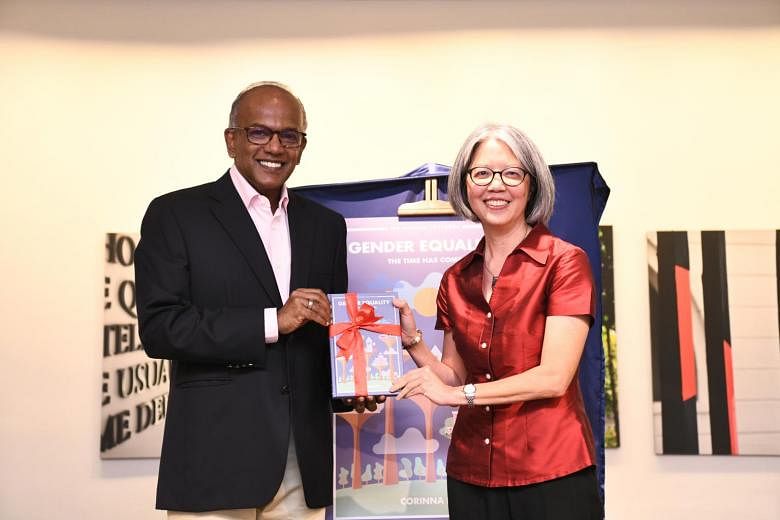SINGAPORE - Getting men involved in promoting healthy masculinity norms and championing gender equality is key to advancing the position of women in society, said veteran women's rights activist Corinna Lim.
Speaking at the launch of her new book called Gender Equality: The Time Has Come on Thursday (Dec 16), Ms Lim said men can play a key role in the ongoing conversation on issues tackling gender stereotypes, and that more men are already doing so.
She said: "We cannot expect women to deal with masculinity issues. Men are more inclined to listen to other men.
"Thankfully, we are seeing an increasing number of men who understand male privilege and how gender stereotypes hurt them. More men are stepping forward to champion gender equality."
Without roping men into the effort, society cannot fix, for instance, inequalities in the workplace and family caregiving, or eliminate gender violence and gender stereotypes, she added.
Ms Lim is the executive director of the Association of Women for Action and Research or Aware.
The book brings together three lectures Ms Lim delivered earlier this year in April and May at the Institute of Policy Studies, where she was its eighth S R Nathan Fellow. The fellowship is named after Singapore's sixth president, who died in 2016.
Ms Lim's lectures touched on key issues affecting women in Singapore today, including the current state of gender equality, implications of masculinity norms and socio-economic barriers that women continue to face at the workplace.
The book launch was held at the Lee Kuan Yew School of Public Policy at the National University of Singapore.
Minister for Law and Home Affairs K. Shanmugam, who was the guest of honour, said in his address that Ms Lim's lectures helped generate robust discussion on these issues, and the lectures and discussion can benefit policymaking.
However, laws and policies must be accompanied by mindset shifts, which must start from a young age, he added.
Mr Shanmugam said: "In schools and at home, our children have to be taught that respect between boys and girls is fundamental.
"We have to encourage our children to pursue their aspirations based on their interests and strengths rather than outmoded gender stereotypes."
Mr Shanmugam also addressed some of the suggestions Ms Lim made in her lectures, and said that while he disagreed with some of them, he agreed with the fundamental aspirations.
Ms Lim, in her speech, lauded Mr Shanmugam for a "groundbreaking" speech he gave in September 2020, saying it can be seen as a "turning point where Singapore became a much more gender equal society".
She said: "That rather feminist speech launched the Conversations on Singapore Women's Development, which I see as the Government's first significant research project and campaign on gender equality."
Ms Lim said she saw five major themes emerge from the conversations.
They are: workplace equality, better caregiver support, protection from gender violence, support for vulnerable groups like single mothers and lower-income women, and countering gender stereotypes.
Ms Lim said these are areas that groups like Aware and the Singapore Council of Women's Organisations have been working on for some time and while there has been progress, there is much work left to be done.
She said: "The people have spoken and I have no doubt that the Government will expand its efforts to tackle these areas."
Ms Lim also included a wish list in her speech, of things she hoped to see in 2025.
One wish was to see women's participation in the Cabinet rise to at least 25 per cent, up from 15 per cent now.
She also hoped for paternity leave to be doubled - from two weeks to four weeks, with take-up rates above 70 per cent, and for flexible work arrangements, including for part-time work to become the norm.
Ms Lim also said she hopes to see the roll-out of sex education in schools that is realistic, relevant and meets the needs of young people.
Correction note: An earlier version of this story said Singapore's sixth president Mr S R Nathan died in 2011. This has been corrected to 2016. We are sorry for the error.


